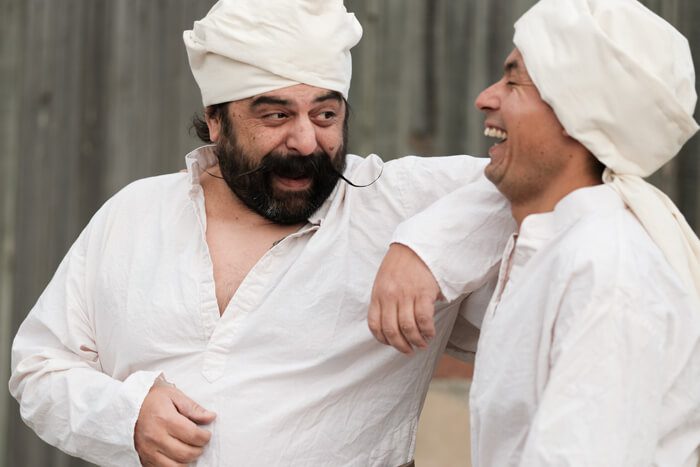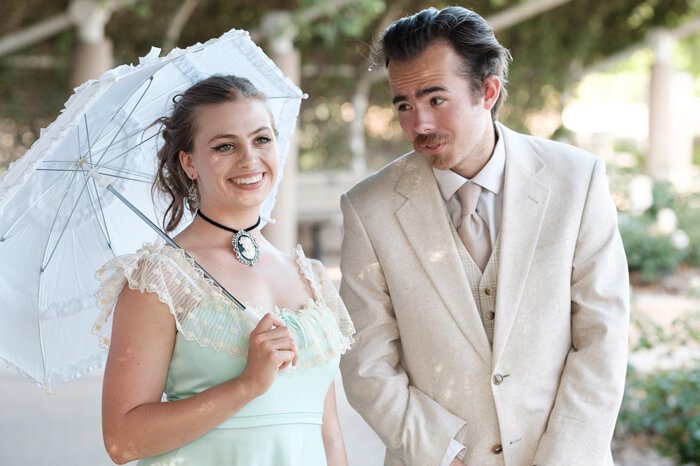
“The truth was,” it’s revealed late in Emily St. John Mandel’s Station Eleven, “the clarinet hated Shakespeare.” The clarinet belongs to a troupe that travels the novel’s post-apocalyptic Midwest, performing music and—of course—Shakespeare. She has a dispute with one of the actors, to whom she admits that she finds Shakespeare insufficient. The Bard’s pre-industrial world of darkness and plagues is too distant, the clarinet argues, to be relevant to their post-industrial world of darkness and plagues. The actor, echoing words spoken in thousands of real-life iterations of this debate, says if she thinks she can do better, why doesn’t she try writing a play herself?
This scene came to mind when I sat down to watch Guards at the Taj in May, first when the board member introducing the play announced the Vortex Theatre’s summer Shakespeare Festival and again when I realized that Rajiv Joseph’s play shares a preoccupation central to Mandel’s novel. The question is not merely why Shakespeare, but why make any art at all? Who is art for, and at what cost?
In Guards at the Taj, answers to the first question accumulate as if without effort: we make art to create objects of resplendent beauty and experiences of wonder; to revel in the joy of creation; to invent worlds beyond this one; to compete with God; to fail. It’s the second question that’s difficult—brutally so.
The play follows two imperial guards charged with protecting—but not looking at—the Taj Mahal. Ray Rey Griego, as Humayun, is bitchy and dutiful; Miguel Martinez is Babur, the dreamer and slouch. They form a classic duo whose banter arrives, slapstick-style, at the dark realization that they will have a hands-on (or, rather, hands-off) role in executing the king’s order that nothing so beautiful as the Taj Mahal ever be built again.
No, they won’t, I think. But when the next scene opens, they already have. To be any more explicit would spoil the play. What they’ve done is to follow orders. The pair slip and slide across a blood-soaked stage, bickering, and I keep asking myself, how is this funny?

“Was it fucked up?” Humayun asks. “Yes, it was. But I don’t have to feel terrible about it.” It’s an utterly contemporary line, an incongruity meant to draw laughs—and to extend the play’s meditation on complicity. “I was just doing my job,” Humayun says more than once. Babur weeps. “I killed beauty,” he says.
The familiar vibe of their dialogue pushes a comparison between the inequalities of seventeenth-century monarchical India and twenty-first-century whatever-this-is America. It’s as if the playwright is underlining how flimsy any parallel between these two worlds would be, then turning around to say, are you sure the parallel is so thin?
Joseph’s work, with its poetic digressions, its distinctive twining of the political and the wondrous, is work that Albuquerque audiences have had few occasions to experience. This is one reason, says director Marc Comstock, that the Vortex’s artistic committee selected the play. It also serves the theater’s mission to produce classic, contemporary, and cutting-edge work.
The Complete Works of William Shakespeare (Abridged), opening July 12, is something of the black sheep of this year’s Shakespeare Festival. Written in the 1980s, Complete Works is as much for the clarinets who hate Shakespeare as for the scholars. It’s also, like all true comedies, for the actors. This will be Ryan Jason Cook’s third time directing and performing in the play, and he describes it as “a quick smattering of Shakespeare,” “slapstick at its finest—a chance to see guys in dresses falling all over themselves.”
As suggested by the title, the play attempts to cover Shakespeare’s entire repertoire—in very short order. The script is meant to be localized, improvisational, and for this production, Albuquerque is written in. Audience members will be invited to contribute. (If you don’t want to play, sit in the back.)
Will Complete Works offer fresh insights on Shakespeare’s relevance to our own dark times? Probably. Regardless, it promises comic relief, and if you don’t need that, you and I must inhabit different centuries.




